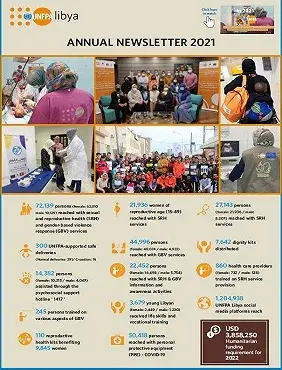In 2021, Libya continued to grapple with the effects of conflict and
insecurity, economic and governance crisis and the impacts of
COVID-19. Despite recent political developments, Libya remains one of
the most volatile countries in the region and at a high risk of sudden
resumption of armed conflict. The presence of a large number of
vulnerable migrants, refugees and internally displaced persons (IDPs) in
addition to uncontrolled borders, foreign armed groups, organized crime
and violence continues to create unrest. This situation exacerbates the
underlying humanitarian situation and hampers Libya's path towards
stability and peaceful transition to a more durable solution.
Libya’s already depleted health system has been further stressed by the
exponential spreading of the COVID-19. Similarly, the long-lasting
instability factors have disproportionately impacted the lives of women
and girls, resulting in increased cases of domestic and other forms of
gender-based violence (GBV). Young people in Libya, a quarter of the
population, face challenges including lack of employment opportunities,
life skills and quality education and are exposed to violence and
instability. The insecurities have caused more vulnerabilities for already
marginalized population groups including migrants, refugees, IDPs and
host communities especially women, girls, children, elderly and persons
with disabilities (PWDs).
UNFPA being the primary sexual and reproductive health agency of the United Nations,
continued its integrated interventions in Libya in the areas of sexual and
reproductive health (SRH), GBV response and youth while analyzing
population dynamics for effective service delivery.
During the onset of conflict and prevalence of the COVID-19 pandemic,
UNFPA along with its partners assured continuity of SRH service
provision, in the most affected areas, through provision of medical
supplies and personal protective equipment (PPEs), human resources
and capacity building, and health information flow. The agency also
supported the health system in the country by building up on the
reproductive, maternal, newborn child and adolescent health (RMNCH)
strategy. UNFPA increased access to services through community
engagement for prevention of COVID-19 and expanding outreach to
strengthen community and system resilience to future risks.
In the year, UNFPA worked with GBV sub-sector members to scale up
and establish comprehensive GBV prevention and response services,
especially in the areas most affected by the conflict. By virtue of the
’1417’ psychosocial support hotline and four Women and Girls Safe
Spaces (WGSS), UNFPA provided much needed psychosocial support,
GBV case management, legal consultations, and imparted life skills and
livelihood training especially to the most vulnerable women and girls.
After supporting the revision of violence against women (VAW) law,
UNFPA along with UNSMIL and UN WOMEN, is also working on
increasing advocacy efforts for establishing protective legal
mechanisms for women and girls and to end impunity for perpetrators.
This will also strengthen the access of migrants to health and protection
services inside and outside detention facilities.
UNFPA engaged young people in the humanitarian and COVID-19
response, as well as peacebuilding efforts and decision-making in Libya.
It also worked on building capacities of the youth on life skills and
provided education on citizenship.
UNFPA worked with the National Statistical Office and humanitarian
partners to improve generation and utilization of quality humanitarian
population data. In 2021, UNFPA prioritized revising the Common
Operational Datasets for Population Statistics (COD-PS) to allow for
better targeting of most vulnerable people and for harmonized data
sources for both humanitarian and development actors in Libya.


